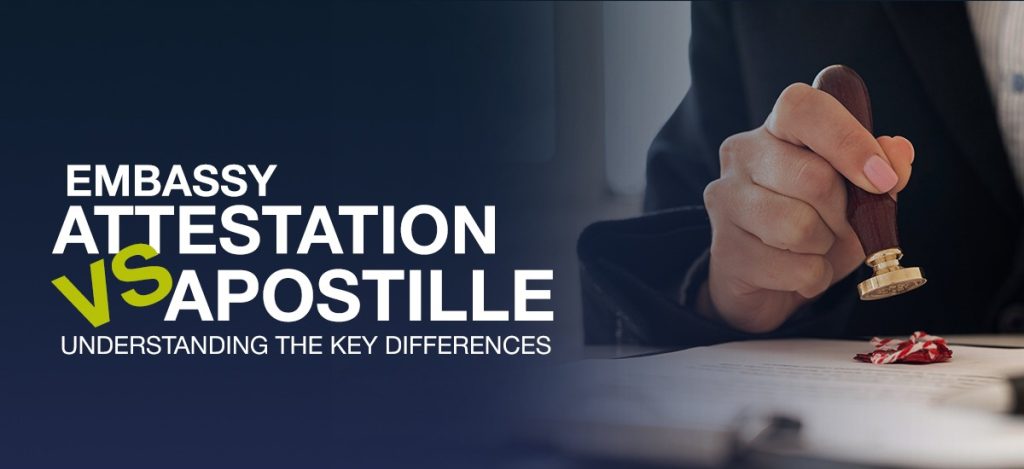Introduction
In the UK, Embassy Attestation and Apostille are two different processes used to authenticate documents abroad. The essential differences are brought out in the succeeding paragraphs.
What is Embassy Attestation?
Embassy attestation is a process where the UK document is authenticated by the Embassy or consulate of the country where the document will be used. Embassy attestation verifies documents to ensure legal acceptance in a foreign country.
The Embassy legalization confirms that a document issued in the UK is genuine and acceptable in another country. It is often essential for different purposes, including employment, education, migration, or business. For UK residents, the procedure involves various steps to authenticate documents for use abroad.
The process typically involves:
- Obtaining a certified copy of the document from the relevant UK authorities.
- Having the document legalized by the UK Foreign and Commonwealth Office (FCO).
- Submitting the document to the Embassy or consulate of the destination country for the Embassy attestation, a stamp/seal applied directly on the original document.
UK Apostille Services
On the other hand, UK Apostille is a simplified process of authenticating documents for use in countries that are party to the Hague Apostille Convention. In the UK, an apostille certificate is issued by the UK Foreign and Commonwealth Office (FCO) for the apostille documents. The process for getting the documents apostilled in the UK,
- Involves obtaining a certified copy of the document from the relevant UK authorities.
- Requires the document to be legalized by the FCO, which issues an apostille certificate.
The key differences between the Embassy Attestation and Apostille are:
- Embassy attestation involves getting the document attested directly by the embassy/consulate, while Apostille does not require embassy involvement.
- Purpose: Embassy attestation is required for documents intended for use in countries not party to the Hague Apostille Convention. Apostille is used for documents intended for use in countries that are party to the Hague Apostille Convention.
- Process: Embassy attestation involves an additional step of submitting the document to the Embassy or Consulate of the destination country, whereas Apostille requires legalization by the FCO.
- Timeframe: Embassy attestation can take a while, whereas Apostille is a typically faster process than embassy.
- An Apostille certificate is attached, while embassy attestation is a stamp/seal applied directly to the original document.
- Apostille is unacceptable for countries like Qatar, Kuwait, UAE and Egypt, as these countries haven’t signed the Hague Convention yet and thus require a complete attestation process.
When Do You Need Embassy Attestation?
The embassy attestation or embassy services will be required in situations like those mentioned below.
- Employment: If a person works in a foreign country, especially in the Middle East, Africa, or Asia, the embassy attestation is essential.
- Education: If you plan to study or apply for equivalence of UK educational qualifications abroad, you must attest your documents.
- Marriage or Family Visa: The embassy attestation must validate personal documents like marriage or birth certificates.
- Business Setup: For registering a business or entering into agreements in a foreign country, embassy attestation is essential.
- Migration: If you intend to migrate to a foreign country, securing long-term visas like residency or citizenship is required. Embassy attestation is very much needed.
The Embassy Attestation Process- steps required
- Notarization: The first step is to have the document in question certified by a public notary or a certified solicitor in the UK, confirming its authenticity.
- Legalization by the UK Foreign, Commonwealth & Development Office (FCDO): The FCDO adds an apostille stamp, certifying that the document is valid for international use under the Hague Convention for countries party to the Hague Apostille Convention.
- Embassy Legalization: For countries not party to the Apostille convention, the documents should be submitted to the relevant Embassy or consulate in the UK for legalization. Additional requirements may vary depending on the country.
- Ministry of Foreign Affairs (MOFA) in the Destination Country: Some countries require further verification by their Ministry of Foreign Affairs after embassy attestation.
Role of Helpline Group in the UK for UK Residents
Backed by a strong and experienced team, Helpline Group brings over 25 years of expertise in company formation, embassy attestation and apostille services, offering clients a seamless, hassle-free experience. Our seasoned professionals possess in-depth knowledge of the latest rules and regulations, ensuring compliance and efficiency.
With a global presence and a tailored approach, we ensure that your attestation services in the UK are handled with precision and professionalism, making us your reliable ally.
